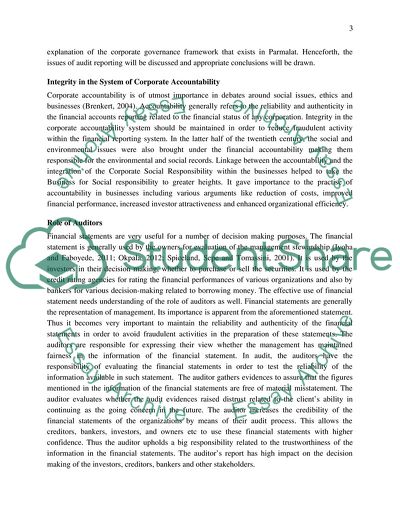Cite this document
(Auditing. The series of scandals caused a general crisis of confidence Essay - 1, n.d.)
Auditing. The series of scandals caused a general crisis of confidence Essay - 1. https://studentshare.org/finance-accounting/1803679-auditing-the-series-of-scandals-caused-a-general-crisis-of-confidence-in-the-integrity-of-the-entire-system-of-corporate-accountability-including-the-role-of-auditors-and-the-effectiveness-of-the-auditing-process
Auditing. The series of scandals caused a general crisis of confidence Essay - 1. https://studentshare.org/finance-accounting/1803679-auditing-the-series-of-scandals-caused-a-general-crisis-of-confidence-in-the-integrity-of-the-entire-system-of-corporate-accountability-including-the-role-of-auditors-and-the-effectiveness-of-the-auditing-process
(Auditing. The Series of Scandals Caused a General Crisis of Confidence Essay - 1)
Auditing. The Series of Scandals Caused a General Crisis of Confidence Essay - 1. https://studentshare.org/finance-accounting/1803679-auditing-the-series-of-scandals-caused-a-general-crisis-of-confidence-in-the-integrity-of-the-entire-system-of-corporate-accountability-including-the-role-of-auditors-and-the-effectiveness-of-the-auditing-process.
Auditing. The Series of Scandals Caused a General Crisis of Confidence Essay - 1. https://studentshare.org/finance-accounting/1803679-auditing-the-series-of-scandals-caused-a-general-crisis-of-confidence-in-the-integrity-of-the-entire-system-of-corporate-accountability-including-the-role-of-auditors-and-the-effectiveness-of-the-auditing-process.
“Auditing. The Series of Scandals Caused a General Crisis of Confidence Essay - 1”. https://studentshare.org/finance-accounting/1803679-auditing-the-series-of-scandals-caused-a-general-crisis-of-confidence-in-the-integrity-of-the-entire-system-of-corporate-accountability-including-the-role-of-auditors-and-the-effectiveness-of-the-auditing-process.


